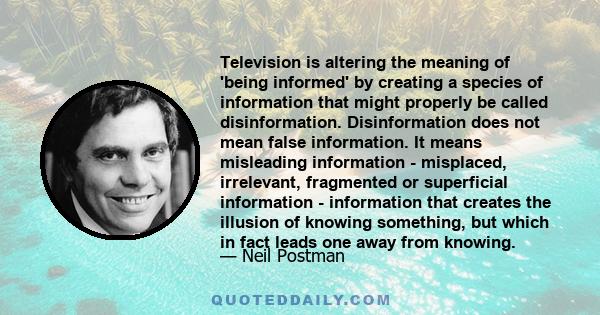Neil Postman Quotes

Neil Postman (2005). “Amusing Ourselves to Death: Public Discourse in the Age of Show Business”, p.93, Penguin
Neil Postman (2009). “Teaching As a Subversive Activity: A No-Holds-Barred Assault on Outdated Teaching Methods-with Dramatic and Practical Proposals on How Education Can Be Made Relevant to Today's World”, p.38, Delta
"Amusing Ourselves to Death: Public Discourse in the Age of Show Business". Book by Neil Postman, 1985.
Neil Postman (2005). “Amusing Ourselves to Death: Public Discourse in the Age of Show Business”, p.129, Penguin
Children enter school as question marks and leave as periods.
Neil Postman (2011). “The End of Education: Redefining the Value of School”, p.70, Vintage
Neil Postman (2005). “Amusing Ourselves to Death: Public Discourse in the Age of Show Business”, p.18, Penguin
Neil Postman (2011). “Technopoly: The Surrender of Culture to Technology”, p.14, Vintage
Neil Postman (2011). “Building a Bridge to the 18th Century: How the Past Can Improve Our Future”, p.201, Vintage
"Amusing Ourselves to Death: Public Discourse in the Age of Show Business". Book by Neil Postman, 1985.
Neil Postman (2011). “The End of Education: Redefining the Value of School”, p.10, Vintage
Neil Postman (2011). “The End of Education: Redefining the Value of School”, p.173, Vintage
Neil Postman (2011). “The End of Education: Redefining the Value of School”, p.192, Vintage
People in distress will sometimes prefer a problem that is familiar to a solution that is not.
Neil Postman (2011). “The End of Education: Redefining the Value of School”, p.96, Vintage
Neil Postman (2011). “Building a Bridge to the 18th Century: How the Past Can Improve Our Future”, p.138, Vintage
Neil Postman (2005). “Amusing Ourselves to Death: Public Discourse in the Age of Show Business”, p.13, Penguin
Neil Postman (2005). “Amusing Ourselves to Death: Public Discourse in the Age of Show Business”, p.106, Penguin
"Amusing Ourselves to Death: Public Discourse in the Age of Show Business". Book by Neil Postman, 1985.
Neil Postman (2005). “Amusing Ourselves to Death: Public Discourse in the Age of Show Business”, p.121, Penguin
An educated mind is practiced in the uses of reason, which inevitably leads to a skeptical outlook.
Neil Postman (2011). “Building a Bridge to the 18th Century: How the Past Can Improve Our Future”, p.164, Vintage






